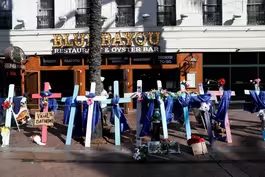
The human trafficking victims behind ‘pig butchering’ scams
Clip: 1/4/2025 | 8m 10sVideo has Closed Captions
How human trafficking victims are forced to run ‘pig butchering’ investment scams
An investment scam called “pig butchering” has cost victims around the world an estimated $75 billion in just the last four years, and it's not just the targets who are being harmed. The imposters on the other end of the line are often human trafficking victims forced to run the scheme by large crime syndicates in Asia. Ali Rogin speaks with former prosecutor Erin West to learn more.
Problems playing video? | Closed Captioning Feedback
Problems playing video? | Closed Captioning Feedback
Major corporate funding for the PBS News Hour is provided by BDO, BNSF, Consumer Cellular, American Cruise Lines, and Raymond James. Funding for the PBS NewsHour Weekend is provided by...

The human trafficking victims behind ‘pig butchering’ scams
Clip: 1/4/2025 | 8m 10sVideo has Closed Captions
An investment scam called “pig butchering” has cost victims around the world an estimated $75 billion in just the last four years, and it's not just the targets who are being harmed. The imposters on the other end of the line are often human trafficking victims forced to run the scheme by large crime syndicates in Asia. Ali Rogin speaks with former prosecutor Erin West to learn more.
Problems playing video? | Closed Captioning Feedback
How to Watch PBS News Hour
PBS News Hour is available to stream on pbs.org and the free PBS App, available on iPhone, Apple TV, Android TV, Android smartphones, Amazon Fire TV, Amazon Fire Tablet, Roku, Samsung Smart TV, and Vizio.
Providing Support for PBS.org
Learn Moreabout PBS online sponsorshipWILLIAM BRANGHAM: Many believe we're living in the golden age of scams.
Romance scams, investment scams, fake job scams.
Even the most skeptical among us are falling prey to increasingly sophisticated frauds.
One particular scam called pig butchering, has cost victims around the world an estimated $75 billion in just the last four years.
Ali Rogin has more on what it is and how to avoid it.
ALI ROGIN: Pig butchering Investment scams have exploded over the last few years.
Named for the practice of farmers fattening hogs before slaughter, the scheme often starts with a simple hi or a seemingly innocent wrong number text on messaging platforms like WhatsApp.
Before they catch on, victims can lose hundreds of thousands and even millions of dollars.
In 2023 alone, Americans reported losing $4.6 billion to investment schemes.
And it's not just the targets that are being harmed.
The imposters on the other end of the line are often human trafficking victims, forced to run the scheme by large crime syndicates in Asia.
Erin West is a former deputy district attorney in Santa Clara County, California.
Erin, thank you so much for being here.
How do these schemes play out?
And what sort of psychological tactics do these scammers use to trick people?
ERIN WEST, Former Deputy District Attorney, Santa Clara County: The way victims are usually contacted is they receive what appears to be a wrong number text.
And those have gotten increasingly clever.
They're doing anything they can to just get your attention long enough to respond so that they can drop in a picture of usually an attractive young Asian female who will say, hi, my name is Jessica.
I hope I'm not bothering you.
We're finding that people will respond to that, and they will start engaging in conversation with a Jessica who over the next 90 days will sell a dream of being with her and her fancy, elevated lifestyle.
And then what happens over time is they get these victims to invest in cryptocurrency like the scammer purports that she did.
That's how she became wealthy.
And our victims will invest a little bit, and they will see it.
They'll see a false dashboard showing their exponential increase in value, and that will lead them to invest more and more until ultimately they have invested every penny they have.
They believe they're rich and that they're going to end up with the girl only to find out that it was all a facade and they've lost everything.
ALI ROGIN: Is loneliness a factor in this in terms of how vulnerable a person might be?
ERIN WEST: What we find is that these scammers fill a void.
They become a trusted confidant.
So, yes, definitely, people who are finding themselves lonely or who are just caught on a bad day.
Sometimes I will hear from people that I would never have engaged in this conversation, but my girlfriend left me this week.
Those people are definitely more likely to engage with a scammer like this.
ALI ROGIN: And what are some of the things you've heard about how these scams are affecting the victim's lives?
ERIN WEST: By the time I see a victim, this victim has lost everything they have.
Often they've incurred more debt as part of the scam, where they believe they have to pay taxes with new money.
And it turns out that the person they trusted with all of this had been plotting against them since the very second they met.
It is a type of crashing, overwhelming, psychological smack in the face to victims.
Some end their lives, others spend their days in misery, really lamenting what has happened to them.
ALI ROGIN: What do we know about where these scams are coming from and who's behind them?
ERIN WEST: What we know is that these scams are coming primarily from Southeast Asia.
They're being run by primarily Chinese organized crime, although the Yakuza has now gotten involved in Korean organized crime after seeing how lucrative this is.
They've built compounds that are akin to small cities built for the express purpose of fleecing the rest of the world of their money.
It's massive and growing.
ALI ROGIN: The target also isn't always the only victim here.
The people who are on the other end of the phone or the computer are also, in many cases, victims of human trafficking themselves.
How does that play into all of this?
ERIN WEST: We have literally never seen a world crisis like this.
We've got Americans and people all over the world who've lost all their money.
And then on the other side, we have human trafficked victims that are forced to do this dirty work.
In order to fill these compounds where the dirty work is done, the organized criminals needed to bring in a workforce.
And to do that, they constructed websites that look very authentic.
And they offer up jobs in Southeast Asia.
And so people from all over apply for these jobs thinking they're getting a really nice live work opportunity.
And when they get there, their passports are seized, they're put in buses and they are moved to these compounds where they are surrounded with men with AK47s.
And they are locked down and forced to do this dirty work 17 hours a day.
The stories I heard of torture were beyond what I've heard in wartime.
They are horrendous violations of human rights.
The NGOs that I spoke with on the ground in Southeast Asia told me seven out of 10 women are coming out of there saying that they were sexually assaulted.
They've seen men who have had their arms broken.
They've seen men with cuts all over their legs.
They people come out with black eyes and broken bodies.
They're being tortured and forced to do this.
ALI ROGIN: Why are these scams so difficult to stop?
ERIN WEST: We've got the geopolitical issues.
We've got the fact that they are being put in countries that are less likely to react well to international intervention.
We've got the fact that they're made up of hundreds and hundreds of people.
300,000 estimated by the United States Institute of Peace are being held against their will.
And among them, there's lots of bosses, and then there are compound owners.
It's been difficult for law enforcement to connect a victim on the ground in the United States with a specific location and a specific bad actor in one of these locations.
It's just difficult to get hands on these bad actors.
Not that we shouldn't try, because we should absolutely be trying, but it's difficult.
ALI ROGIN: If someone gets a text message that they think might be suspicious, what are some signs that they can look out for if they engage?
ERIN WEST: There is pretty much a textbook operation for how these bad actors conduct this business.
What they will do is they'll begin an initial conversation with our victims, whether it is on a text message or perhaps they're in a group on Facebook where someone they didn't know is reaching out to them and then showing them an attractive picture.
The scammer will ask the victims to move the conversation to a platform like WhatsApp or Telegram.
That is to get them out of the prying eyes of the platforms who are looking for them.
But what they'll ultimately say is, you know, I don't really know how to invest in cryptocurrency either, but my uncle taught me, and my uncle can teach you.
It's always a hand off to yet another person who is more of an expert in the crypto business.
People should be wary these days.
Literally anytime someone is reaching out to you from an electronic platform of any kind that you don't recognize this person.
This era is not the time to be making new friends on social media because there are way too many bad actors out there trying to take advantage of you.
ALI ROGIN: That is former prosecutor Erin West.
Thank you so much for joining us.
ERIN WEST: You're welcome.
Carter honored in Georgia on first day of memorial events
Video has Closed Captions
Clip: 1/4/2025 | 2m 18s | Jimmy Carter honored in his home state of Georgia on first day of memorial events (2m 18s)
Locals ask how warnings of New Orleans attack were missed
Video has Closed Captions
Clip: 1/4/2025 | 5m 17s | As New Orleans recovers from terror attack, locals ask how warning signs were missed (5m 17s)
Providing Support for PBS.org
Learn Moreabout PBS online sponsorship
- News and Public Affairs

FRONTLINE is investigative journalism that questions, explains and changes our world.

- News and Public Affairs

Amanpour and Company features conversations with leaders and decision makers.












Support for PBS provided by:
Major corporate funding for the PBS News Hour is provided by BDO, BNSF, Consumer Cellular, American Cruise Lines, and Raymond James. Funding for the PBS NewsHour Weekend is provided by...

